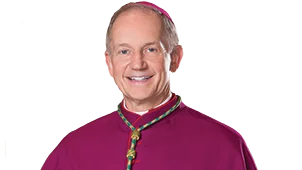
Rev. James D. Conley, D.D., S.T.L. | Diocese of Lincoln website
Newly elected popes often choose their papal name to reflect the type of leadership they wish to embody. The name "Leo," meaning "lion" in Latin, has been chosen by 13 popes before Pope Leo XIV, each with varying legacies.
Pope Saint Leo I, known as "the Great," served from 440 to 461 and is remembered for his diplomatic success in persuading Attila the Hun not to invade Rome. He also contributed significantly to Church doctrine through his writings on Christ's dual nature.
Pope Saint Leo II served briefly from 682 to 683 and supported the Sixth Ecumenical Council's affirmation of Christ's human and divine wills.
Pope Saint Leo III reigned from 795 to 816 and was noted for his charitable work and miraculous recovery from an attack that left him temporarily blind and mute. He famously crowned Charlemagne as the first sovereign of the Holy Roman Empire.
Pope Saint Leo IV, who led from 847 to 855, fortified Vatican City's defenses against potential invasions by Turks by repairing its walls.
Pope Leo V had a short papacy in August 903 before being imprisoned by an antipope named Christopher. His fate remains uncertain, with reports suggesting he either died naturally or was executed.
Little is known about Pope Leo VI, who served around seven months in 928 but issued a notable papal bull regarding ecclesiastical obedience in Dalmatia.
During his tenure from 936 to 939, Pope Leo VII focused on resolving conflicts between regional leaders and supporting reforms within Germany.
Leo VIII became pope after John XII's deposition but faced opposition that saw him expelled shortly after taking office. He returned following John XII's death but only held the position briefly until his own death.
Pope Leo IX aimed at reforming Church issues such as simony during his reign from 1049 to 1054. His efforts at reconciliation with Constantinople were cut short by his death before any resolution could be reached, leading up to the Great Schism later that year.
Leo X became pope at age 32 under expectations of being easily influenced due to his youth. His focus on cultural indulgences rather than addressing Church corruption coincided with the rise of Protestantism starting in 1517.
Elected at age 70, Pope Leo XI had a brief papacy of just over three weeks in April-May of 1605 due to illness but resisted nepotistic pressures during this time.
From 1823-1829, Pope Leo XII sought spiritual renewal within the Church while opposing secret societies like freemasonry despite perceptions of ineffective leadership.
Lastly, Pope Leo XIII served from 1878-1903 and worked towards fostering international relations while advocating for workers' rights and religious devotion. He notably authored a prayer against perceived Satanic threats after experiencing a vision.





 Alerts Sign-up
Alerts Sign-up